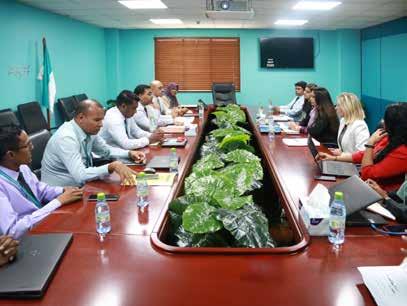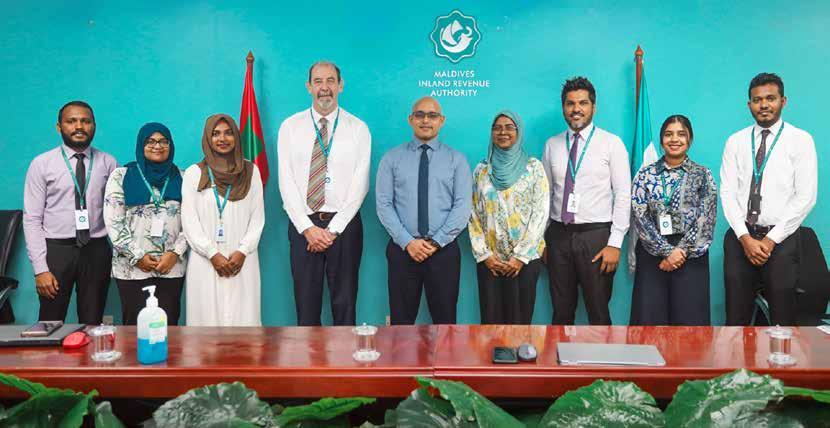Tax and Development Case Study
Leveraging technical assistance through Tax Inspectors Without Borders to build audit capacity and tackle tax crime in

Tax and Development Case Study
Leveraging technical assistance through Tax Inspectors Without Borders to build audit capacity and tackle tax crime in




TAX INSPECTORS WITHOUT BORDERS (TIWB), a joint initiative of the Organisation for Economic Co-operation and Development (OECD) and the United Nations Development Programme (UNDP), supports developing country tax administrations in building the capacity to improve their tax systems. Through TIWB, senior experts from partner tax administrations1, and/or from the UNDP-managed TIWB Roster of Tax Experts, work side-by-side with local tax administration officials2, sharing their knowledge of international tax matters and their experience in dealing with them. This co-operation covers topics such as transfer pricing audits of multinational enterprises (MNEs), the effective use of automatically exchanged information under the Common Reporting Standard (CRS), and the application of internationally accepted standards in investigating and combatting illicit financial flows.
The Maldives is an upper-middle-income economy in South Asia with a population of some 550 000 people, dispersed across 185 islands. Its economy is heavily dependent on tourism as the main driver of economic growth3, with over 60 000 beds distributed amongst diverse types of accommodations, including resorts, hotels, guesthouses and safari vessels. Having claimed the largest percentage share (21.4%) of the nominal Gross Domestic Product (GDP) in 2021, the tourism and hospitality sector sustains a positive growth trajectory. This sector also accounts for a significant share of the Maldives’ tax revenues, as does construction4. The risks of base erosion and profit shifting (BEPS) practices affect both of these sectors.
The Maldives is making strides in its fight against BEPS, tax evasion and illicit financial flows. The country has been a member of the Global Forum on Transparency and Exchange of Information for Tax Purposes5 since 2016, and of the OECD/G20 Inclusive Framework on BEPS6 since 2017. Through these initiatives, the Maldives works with other countries on implementing tax transparency standards and applying BEPS measures to address corporate tax avoidance, as well as on developing further standards to curb BEPS, such as the Two-Pillar Solution to Address the Tax Challenges Arising from the Digitalisation of the Economy7. TIWB supports the Maldives in these efforts and serves as a key partner of the Maldives Inland Revenue Authority (MIRA) in strengthening the effective taxation of economic activities in the
1. https://www.tiwb.org/en/get-involved.html.
2. https://www.tiwb.org/en/get-involved.html.
3. https://www.worldbank.org/en/country/maldives/overview.
country. This includes assistance with transfer pricing and international tax audits of cross-border transactions, particularly those involving multinational enterprises (MNEs), as well as support for criminal tax investigations.
This support has been fundamental, for example, in building MIRA’s capacity to conduct transfer pricing audits, including a targeted audit of MNEs’ relatedparty transactions in the tourism industry. As MIRA is a relatively young tax administration with limited technical expertise in this area, TIWB experts’ assistance proved pivotal in addressing instances of aggressive tax planning and tax avoidance by the MNEs operating in the country’s tourism sector. Through a dedicated TIWB programme for criminal tax investigation (TIWB-CI), the Maldives has also benefited from technical assistance targeting tax crime.
4. Other sectors, such as services, retail, trading and financial, are also of relevance, as is the exploitation of certain natural resources (e.g., through forestry and farming).
5. https://www.oecd.org/en/networks/global-forum-tax-transparency.html
6. https://www.oecd.org/en/topics/policy-issues/base-erosion-and-profit-shifting-beps.html
7. Outcome Statement on the Two-Pillar Solution to Address the Tax Challenges Arising from the Digitalisation of the Economy –11 July 2023. https://www.oecd.org/en/about/news/announcements/2023/07/outcome-statement-on-the-two-pillar-solution-to-address-the-tax-challenges-arising-from-thedigitalisation-of-the-economy-july-2023.html


The TIWB programmes have played a transformative role in enhancing MIRA’s audit and investigation capabilities. In addition to strengthening taxpayer compliance, they have provided our teams with invaluable hands-on experience and technical expertise. These engagements have significantly improved the quality of our assessments and investigations and continue to guide us in aligning with international best practices.
Mr Hassan Zareer, Commissioner General of Taxation, Maldives Inland Revenue Authority
REVENUE IMPACT
l USD 4.5 million in tax collected through two TIWB transfer pricing audit programmes
l USD 5.4 million in tax collected through the TIWB-CI programme
l USD 3.42 million in reduced carry forward losses*
CASEWORK
l 23 transfer pricing audit cases examined
l 10 tax crime investigations conducted
CAPACITY-BUILDING ACTIVITIES
l 30 tax officials trained in transfer pricing audits
l 14 officials from the Prosecutor’s General Office trained in tax crime legislation and case resolution
l 80 tax officials trained in investigative techniques for tax crime cases
* Carry forward losses can be reduced through income adjustments made during a tax audit. Income adjustments, which are offset by losses carried forward, do not result in immediate tax collection. However, they do reduce future loss offsets, enabling countries to collect tax revenue in later periods. The reduced pool of available losses means future profits will be taxable sooner, resulting in a deferred revenue gain for the country.

When TIWB started to work with the Maldives in 2018, the MIRA tax administration was in its infancy. Its staff lacked extensive technical knowledge or practical experience in conducting transfer pricing audits. It also struggled to address the threat posed by increasingly complex and innovative forms of financial crime. Recognising these capacity gaps, MIRA sought to form a skilled workforce with the technical expertise needed to effectively carry out the required tasks.
Under the initial TIWB programme, MIRA received technical assistance on transfer pricing and international taxation from an expert deployed by the Financial

Directorate of the Slovak Republic. From August 2018 to July 2020, MIRA officials and the TIWB expert worked together on 11 audit cases, including eight in the tourism, hospitality and construction sectors. The casework encompassed a broad range of tax issues, including intragroup services and loans, as well as transactions involving intangibles. The TIWB assistance was instrumental in increasing the capacity of MIRA’s auditors in these areas.
Following this successful first experience, the Maldives requested a second TIWB programme with a specific focus on the tourism and hospitality sector. Launched in July 2020 with the assistance of an expert sourced from the TIWB Roster of Experts, this second programme zeroed in on guidance for MIRA’s transfer pricing audits of MNEs operating in the sector. As they worked


together on real cases, following TIWB’s learning-bydoing approach, MIRA’s tax auditors gained industry knowledge and acquired the expertise required to understand diverse business models and to address common transfer pricing issues arising in this industry. MIRA officials collaborated with the TIWB expert on 12 cases, building their knowledge and skills thanks to the expert guidance and advice they received.
The impact of the two TIWB audit programmes in the Maldives was considerable, both in terms of revenue and beyond.
The combined revenue impact of the two TIWB programmes in the Maldives has been calculated at approximately USD 4.5 million (in Maldivian Rufiyaa, MVR 69.3 million) being collected in taxes, as a result of tax assessments valued at USD 14.5 million (MVR 223.3 million). In addition, income adjustments made during the tax audits supported by TIWB have led to USD 3.42 million in reduced carry forward losses8 Although those income adjustments have not resulted in immediate tax collection, they have reduced future loss offsets, enabling the Maldives to collect tax revenue in later periods. The reduced pool of available losses means future profits will be taxable sooner, resulting in a deferred revenue gain for the Maldives.




In addition to the impact on revenue, the TIWB audit programmes had a notable impact on human resources and institutional development.
Thanks to TIWB’s continued assistance, the improvements in MIRA’s tax auditors’ skills and confidence resulted in more effective audits and increased voluntary compliance.
In 2018, MIRA’s Large Business Department, which is in charge of auditing economic activities of MNEs in the Maldives, lacked experienced staff and budget limitations made it difficult to envisage specialised training. The first TIWB programme addressed this need, enabling 30 tax officials to acquire and apply knowledge and skills in transfer pricing audits. The activities and coaching under this programme included selecting audit cases based on risk assessment, writing position papers, conducting interviews with taxpayers, and performing functional analysis. The second TIWB programme, which concluded in June 2024, resulted in improvements in communication and interactions with taxpayers thanks to the further enhancement of the auditors’ knowledge and technical skills. MIRA acknowledged the key role played by TIWB experts in achieving these advances.
MIRA also made institutional developments on several fronts, including improved legislation, organisational restructuring, reinforced audit procedures, and expanded information resources.
In 2019, during the first TIWB programme, MIRA created its International Tax Audit Division, specialised in
transfer pricing. This facilitated TIWB’s unique learningby-doing approach in addressing an array of transfer pricing audit cases.
Building on recommendations formulated by the TIWB experts, new transfer pricing regulations –regarding issues such as documentation requirements –entered into force in 2020. TIWB experts suggested improvements to the regulations, including, for example, expanded guidance on the application of the arm’s length principle.
The TIWB experts also made important recommendations on audit procedures and on the use of diverse sources of information. As a result, MIRA’s International Tax Audit Division can now access company data and information via a database, which has helped increase its credibility with taxpayers.
Building on the success of these two tax audit programmes, in 2021 the Maldives requested TIWB-CI support to improve its capacity to detect, investigate, and prosecute tax crimes, and to help in recovering the proceeds of those crimes. TIWB-CI focuses on enhancing a jurisdiction’s capacity to resolve tax crime cases through targeted capacity-building and real-time cooperation on complex tax crime investigations.
The Maldives’ TIWB-CI programme was officially launched in July 2021, with the Australian Taxation Office (ATO) as its partner administration. The first phase of the programme commenced with a week-long workshop where investigators from MIRA and a crosssection of other financial crime authorities conducted a
BEPS Action 13 (on Transfer Pricing Documentation) requires that Inclusive Framework members demand that MNEs provide details on the global allocation of their income and profits, taxes paid, and economic activity in the tax jurisdictions in which they operate. Known as country-by-country reports, this information can be used by tax administrations as a high-level risk assessment tool to help in identifying transfer pricing and other BEPS activities.
For the fiscal year 2021, the Maldives put in place a domestic filing requirement as well as Qualifying Competent Authority Agreements, and also met confidentiality and appropriate use requirements. The Maldives is the first Small Island Developing State to implement the BEPS minimum standard for country-by-country reporting.
In 2022, the Maldives began to receive country-by-country reports from other jurisdictions under agreements on exchange of information. The 2025 Peer Review Report9 shows that there is no need for improvement in the Maldives’ implementation of BEPS Action 13.
9. OECD (2025), Country-by-Country Reporting – Compilation of 2025 Peer Review Reports: Inclusive Framework on BEPS: Action 13, OECD/G20 Base Erosion and Profit Shifting Project, OECD Publishing, Paris, https://doi.org/10.1787/e3c07579-en
self-assessment using the OECD’s Tax Crime Investigation Maturity Model 10. This diagnostic tool, based on the OECD’s Ten Global Principles for Fighting Tax Crime11, is designed to help in identifying gaps in enforcement frameworks, as well as in developing strategies to address those gaps. The result was a comprehensive action plan, comprising 22 recommendations focused on equipping local investigators with the laws, tools, and knowledge needed to effectively combat tax crime.
During the second phase of the programme, from 2022 to 2024, an ATO expert contributed extensive onsite and remote assistance in resolving ten ongoing criminal tax investigations, as well as targeted capacity-building to address priority action-plan recommendations.
The TIWB-CI programme had considerable impact on the Maldives’ capacity to combat tax crime, with MIRA’s Deputy Director of Investigations stating:
The TIWB programme’s utilisation of the OECD’s Maturity Model, with its intensive gap analysis, served as a critical foundation for understanding the nuanced challenges faced by MIRA in tax crime investigations. What truly sets this programme apart is its learning-by-doing approach, making it a uniquely enriching experience. The practical application of knowledge gained
proved to be a game-changer, empowering MIRA’s investigation team to navigate complex scenarios with newfound confidence.
Ms Fathimath Shiuma, Deputy Director, Investigation Division, Maldives Inland RevenueAuthority
All ten of these complex tax crime investigations were concluded. The total tax impact in financial terms was USD 11.1 million (MVR 170.9 million), with USD 5.4 million (MVR 84 million) in taxes having been recovered by the end of the programme.
In addition, ATO’s support had a positive impact on the Maldives’ legal, operational, and institutional frameworks for fighting tax crime. The many successes of the programme include:
l A Joint-Intelligence Sharing Arrangement between MIRA and the Maldives Monetary Authority’s Financial Intelligence Unit paved the way for working group-level meetings between both agencies. This collaboration has enhanced co-operation, improved the quality of case referrals, and reduced the time required for preliminary analysis and discussion of emerging trends and issues in the financial crime landscape. It has also deepened understanding and trust between the two agencies, enabling MIRA to better formulate strategies to address tax compliance risks arising from such crimes.
10. https://www.oecd.org/en/topics/sub-issues/comparative-analysis-of-tax-administrations/tax-maturity-models.html#tax-crime 11. https://www.oecd.org/content/dam/oecd/en/publications/reports/2017/11/fighting-tax-crime_c9374f32/63530cd2-en.pdf

l The publication of the Tax Crime Mitigation Strategy, with performance indicators for the prevention, detection, and investigation of tax crimes: MIRA anticipates that this document will help cultivate a whole-of-government approach to fighting tax crime, while streamlining internal co-ordination amongst the various units that support tax crime investigations.
l Development of a MIRA Tax Crime Investigation Manual: This manual is expected to reduce investigation lead times by defining and establishing processes conducive to better investigation outcomes.
l Training for the Maldives Prosecutor’s General Office: The training has resulted in a deeper understanding of tax crime legislation and an improved, joint approach to case resolution.
l Training for MIRA on a range of specialised topics: The training has led to improved capabilities in information collection and analysis, as well as more innovative approaches being taken; this, in turn, accelerates investigations and contributes to case breakthroughs. In particular, MIRA has noted that the training in investigative techniques has resulted in improvements in the quality of the information gathered, contributing to more successful interview outcomes.
l The creation of a bespoke Intelligence Team within MIRA to strengthen its investigative function.


TIWB has demonstrated that its unique approach can help a young tax administration, such as MIRA, build a skilled workforce on transfer pricing and criminal tax investigation, for example:
l TIWB’s diversified offer and tailor-made programmes allow for the gradual deployment of bespoke expertise to respond to each tax administration’s specific needs in various areas. In the Maldives, technical assistance began with work on general transfer pricing topics before focusing on specific BEPS issues in the tourism sector, and on supporting complex criminal investigations.
l TIWB goes beyond casework, contributing to the improvement of countries’ legislative and administrative tax frameworks. MIRA benefitted from the TIWB experts’ recommendations on revising their transfer pricing regulations. Thanks to ATO’s support, MIRA was able to improve the Maldives’ legal, operational, and institutional frameworks for fighting tax crime, taking a whole-of-government approach.
l TIWB’s learning-by-doing approach results in enhanced auditor skills and confidence. The selfassurance gained by MIRA tax officials has helped them to engage in more fruitful and detailed case discussions, capitalising on the guidance and coaching lent by the TIWB experts.
l The engagement of senior management is a driving force behind the success of TIWB programmes. In the Maldives, this was key in ensuring that the resources required to best leverage the TIWB assistance were made available.
l TIWB programmes allow for a combination of onsite missions and remote assistance from the experts. By taking advantage of this availability and engaging in regular follow-ups, MIRA staff were able to sustain momentum on their casework.
l Staff retention is an important challenge for sustainable capacity-building. Through the TIWB programmes, MIRA recognised the knowledge gap resulting from its difficulties in retaining trained staff. Today MIRA is working on overcoming this challenge by putting in place systems and processes for knowledge transfer to new staff.
TIWB’s tailored, learning-by-doing approach has helped MIRA strengthen its technical expertise, confidence, and institutional frameworks to fight MNEs’ tax avoidance and tax crime sustainably. Through hands-on coaching, senior management engagement, and ongoing expert support, MIRA has enhanced its skills in transfer pricing, auditing practices, and tax crime investigation while developing systems to sustain knowledge over time and build a strong tax administration for the future.

The joint OECD/UNDP initiative, TIWB, has helped tax administrations in developing countries to raise USD 2.40 billion in additional tax revenues, USD 6.39 billion in tax assessments and disallowed 2.50 billion in carry forward losses across Africa, Asia and the Pacific, Eastern Europe and Latin America and the Caribbean since its inception in 2012.
At the end of 2024, TIWB has supported 70 jurisdictions with 155 completed and ongoing programmes, including 35 South-South programmes. Programmes have been commenced in 39 jurisdictions in Africa, 14 jurisdictions in Asia and the Pacific, 10 jurisdictions in Latin America and the Caribbean and 7 jurisdictions in Eastern Europe.
More information about the TIWB initiative can be found on its website and the 2025 TIWB Annual Report
REVENUE IMPACT OF TIWB PROGRAMMES WORLDWIDE
Note: The figures reflect results (in USD) of TIWB programmes from 2012 to 31 December 2024. All reported
are generated through the collective work of TIWB with the African Tax Administration Forum, the OECD and the World Bank Group. Source: TIWB Secretariat

The host administration identifies its audit assistance needs:
The focal point creates an account on the TIWB Portal12, which is then approved by the TIWB Secretariat.
The host administration completes an online Assistance Request:
The focal point fills out an Assistance Request on the TIWB Portal and uploads the signed request.
TIWB Identifies and selects the TIWB expert:
The TIWB Secretariat commences the search for a qualified expert to implement the programme.
The parties sign the terms of reference:
Once a qualified expert has been identified and funding has been secured, the terms of reference are signed by the relevant parties.
The TIWB programme commences onsite and/or virtually:
The TIWB programme is launched and an initial scoping mission is carried out. Over the subsequent 18 to 24 months, onsite missions and/or virtual missions are delivered to the host administration by the TIWB expert.
Monitoring and reporting are conducted via mission reports and evaluations: All completed programmes are duly monitored and evaluated to ensure transparency around the results.
12. https://portal.tiwb.org/en-US/

Disclaimer
This work is jointly published under the responsibility of the Secretary-General of the OECD and the Administrator of UNDP. The opinions expressed and arguments employed herein do not necessarily reflect the official views of the OECD or UNDP or of the governments of their respective member countries. This document, as well as any data and any map included herein, are without prejudice to the status of or sovereignty over any territory, to the delimitation of international frontiers and boundaries and to the name of any territory, city or area.

For more information: TaxandDevelopment@oecd.org https://oe.cd/tax4dev-studies https://www.tiwb.org @OECDtax

© OECD 2025
The use of this work, whether digital or print, is governed by the Terms and Conditions to be found at www.oecd.org/termsandconditions. Images © OECD and Shutterstock.com.